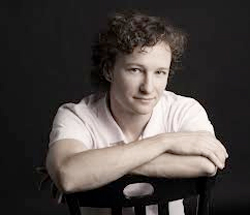by Mike Telin

On Saturday, August 24, Martin Helmchen will make his Cleveland Orchestra debut at Blossom Music Center performing Beethoven’s Piano Concerto No. 1 under the direction of conductor David Afkham. The Concerto also includes Schubert’s Symphony in C major (The Great)and Beethoven’s Overture to Coriolan
Known as a performer possessing a “highly virtuosic yet unpretentious style,” Helmchen first gained international attention after winning the 2001 Clara Haskil Competition. His recent concerto debuts include performances with the Berlin Philharmonic and Herbert Blomstedt, the Vienna Philharmonic and Valery Gergiev, the London Philharmonic with Vladimir Jurowski and the City of Birmingham Symphony Orchestra and Andris Nelsons. In 2011 he made his Tanglewood Festival debut with the Boston Symphony and Christoph von Dohnányi. And what are his thoughts about this week’s Cleveland Orchestra debut? “It’s so very exciting,” Helmchen told us by telephone from Berlin. “It’s one of the things that I when I look at my calendar it is a little bit unbelievable — it’s such a great opportunity.”
Helmchen says he always looks forward to playing the Beethoven concerto, “It is maybe the clearest [representation] of the young Beethoven. Of course [at the time] he had already written some extremely witty chamber music and piano sonatas.” He also thinks it is a composition that predicts the composer’s future. “Even with our [modern] ears many things still sound so funny, and for the Viennese ears of that time it must have been much stronger.” Helmchen cites the composer’s extended use of the sustaining pedal in the development of the first movement, an effect he says Beethoven basically invented.
Helmchen thinks the concerto also foreshadows minimalism. “There are some minimalistic things that happen where is seems like the material doesn’t move for many bars and you might think – is he out of ideas or what? And one of the greatest effects is when the music finally does move.” He also says he still finds humor in the concerto’s final movement especially during the rumba-like section. “it sounds like ‘Tico-Tico’ and I always sort of laugh when I play it. Then on the other hand there is a tremendous spirituality and depth in the slow movement which is already leading to the late Beethoven and surpasses what other composers were doing at that time — even beyond what Haydn and Mozart dared to do. It’s not just self confidence, a ‘here I am’ [attitude] but it’s also deep, philosophic and spiritual. These are all incredible things and it’s great that this spirit is still transported even today.”
In 2005 Martin Helmchen was a Fellow of the Borletti-Buitoni-Trust and the “Credit Suisse Young Artist” in 2006 culminating with his debut with the Vienna Philharmonic Orchestra under Valery Gergiev at the Lucerne Festival. And from 2005 to 2007 he was a BBC New Generation Artist. As a young classical music artist does he feel any pressure to attract the younger generations to the art form? “That’s a very good question and we could [talk] it for a very long time. But yes, I do feel a responsibility and yes, pressure is the right word because there are some people who are natural communicators and who use the opportunity of every concert to go into the schools and introduce the music and the instrument. I love to do that and whenever I present lecture concerts at schools or at homes for sick people it is the most satisfying thing.”
But he always thinks that outreach work is a profession by itself that can take as much energy as playing a concert. “I truly admire the people who do this on a regular basis like my good friend Lars Vogt, who has founded many of these initiatives like Rhapsody in the Schools.” Helmchen admits to having a little bit of a guilty conscience for not doing more. “I do think that outreach work should be much more in the center of what we are doing. I always wonder — and it is something which I can’t quite explain because we do have so many youth orchestras and national youth competitions and so many brilliant young international soloists so there is no problem with young people playing classical music. But, when you go to concerts and look at the age [of the audience] there is definitely a problem and the best way to work on things like that is with things like Rhapsody in the Schools.”
Trying to balance his busy performing career and outreach activities leaves Helmchen little time to simply relax, but he says “I enjoy being a pianist very much because we have masterworks in every corner of music history.” But when asked if he thinks about slowing down or maybe even retirement he laughs. “I do want to play concerts for ever and that question of retirement, if there is such a thing for musicians, no, I don’t really think of retiring. I know that I won’t miss this intense of a performance life that I am having right now so there does have to be some point with less traveling and with more of a constant everyday life, so I don’t intend to live like this forever – being away all the time and performing every couple of days. But for the moment this is very fulfilling and I still learn so much from every concert that I play and from my chamber music partners and singers that I work with. It’s still an intense learning time and the concerts I feel do great benefit in terms of my development.”
Published on ClevelandClassical.com August 19, 2013
Click here for a printable version of this article.


